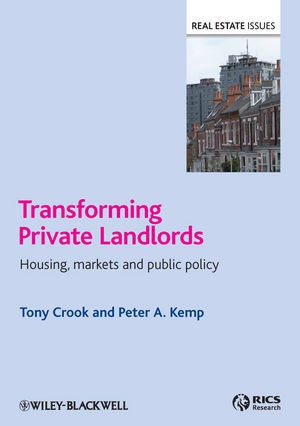Read more
Informationen zum Autor Tony Crook is Pro-Vice Chancellor and Professor of Town and Regional Planning at the University of Sheffield. Peter Kemp is Barnett Professor of Social Policy at the University of Oxford and a Fellow of St Cross College. The authors are leading academic experts on privately rented housing in Britain, a subject that they have been researching separately and together since 1978 and 1979 respectively. They have conducted a succession of quantitative and qualitative studies of private landlords and are the authors of numerous reports and other publications on this topic. Klappentext This book explores the origins, extent and implications of this revival in the fortunes of private landlordism. It presents an in-depth, scholarly analysis of private landlords, the rationales for and ways in which governments have sought to revitalise investment in residential lettings, and their success in doing so. It also assesses the extent to which landlordism has been transformed in recent years and the lessons for policy that can be learned from this experience. The book draws on the extensive research into private landlords conducted by the authors over the past two decades. This includes projects funded by the Joseph Rowntree Foundation, the predecessor departments to the Department for Communities and Local Government, Scottish Homes, and the Economic and Social Research Council. It fills a major gap in the literature about an important actor in housing provision and the built environment. Most of the recent work on private landlords has been published as research reports and there is a lack of book length scholarly study aimed at an academic rather than a policy audience. Zusammenfassung This book explores the origins, extent and implications of this revival in the fortunes of private landlordism. It presents an in-depth, scholarly analysis of private landlords, the rationales for and ways in which governments have sought to revitalise investment in residential lettings, and their success in doing so. Inhaltsverzeichnis 1. Introduction . This chapter briefly sets the scene, describes the aims of the book, presents the analytical perspective that will be used and outlines the structure of the book.. 2. Private landlords in historical perspective . When the Conservative Government of Mrs Thatcher came to office in 1979 determined to roll back the state, the privately rented sector was a 'stagnant backwater of backwater of the market economy' and private landlords had a very poor reputation. The sector had been suffering from net disinvestment and declining in size since the early years of the twentieth century. This chapter presents the context within which the incoming Thatcher Government of 1979 sought to breath new life into private letting as an investment. It will describe the nature of private landlordism in its Victorian heyday and document the subsequent decline of landlordism up to the late 1970s.. 3. Government policy since 1979 . The 1980s and 1990s witnessed a series of measures that were introduced in order to revive the privately rented housing market, a process that to some extent has continued into the new century. This chapter critically examines the development of government policy towards the privately rented sector, and especially the goal of reviving the private landlord, under the Conservative (1979-1997) and New Labour Governments (1997 to date).. 4. Private landlordism in contemporary Britain . This chapter examines the contemporary nature of private landlordism in Britain. It also seeks to examine the extent to which private landlordism has changed over the period since 1979. It draws on a succession of surveys of private landlords conducted by the authors and subsequent surveys carried out by th...

